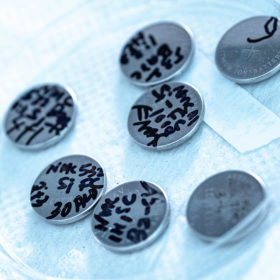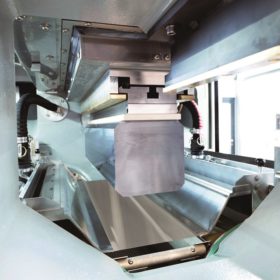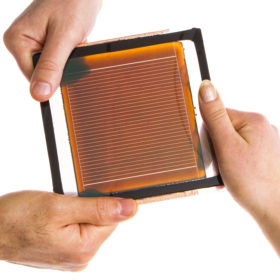An alumina lining for silicon in storage
Scientists at Rice University in the U.S. have conducted experiments with lithium-ion batteries using silicon as an anode material and made an unexpected discovery regarding an aluminum oxide passivation layer at the cathode. The finding could open up a new pathway toward better performing lithium-ion batteries.
For a bigger battery, just add manganese
Scientists at the University of Southern Denmark working with sodium-ion batteries found that a new electrode material incorporating iron, manganese and phosphorous could increase both the power and capacity of the batteries.
Tandem cells approaching 30% efficiency
Scientists at the Helmholtz Zentrum Berlin have taken back the world efficiency record for a perovskite/silicon tandem solar cell, achieving 29.15% with a device measuring 1cm². The record has been confirmed by Fraunhofer ISE, and according to HZB, this means that the 30% efficiency mark is within reach.
Proving perovskite reliability
A new paper published in Nature claims that scientists have reached a consensus on the procedures for the testing of perovskite cells, which they say will lead to better reproducibility and comparability of data produced by different laboratories, and ultimately a better understanding of the degradation pathways affecting perovskite solar cells, and the most effective ways to mitigate them.
MIT researchers put slimmer silicon back on the table
With solar grade polysilicon prices having plummeted in recent years, cutting down on consumption of the material has not been a priority. But strategies exist and significant savings can be made through deploying thinner wafers that use less silicon, insists a new paper published by MIT and NREL. And as manufacturers are increasingly hitting dead ends on other routes to cost reduction, this option could be back on the table for many.
Perovskites meet the stability standard
European research group Solliance says its perovskite modules have passed three key industry standard reliability tests: Light soaking, damp heat and thermal cycling. The group said it is the first time perovskite modules of that size have achieved such results and represents a milestone in the technology’s move toward commercialization.
Solving seasonal storage with aluminum cycling
Scientists at Switzerland’s University of Applied Sciences Rapperswil have demonstrated an aluminum conversion process which could be valuable for long-term renewable energy storage. Simulations suggest that by employing the process, a new multi-family building in Switzerland could meet all its energy demand from a 7-11 kWp solar system.
Lead-free soldering in modules: It can be done!
pv magazine’s UP sustainability campaign has investigated the use of lead in PV panels and found, with soldered cell interconnections in particular, viable alternatives are scarce. However, German headquartered manufacturer Opes Solutions has launched a small module for the off-grid market featuring lead-free solder, developed at the request of a customer. We caught up with Opes CEO Robert Händel for a closer look at the module and the challenges and benefits of going lead-free.
Hot charge extraction to push perovskite efficiency
With the absorption of ‘hot’ charges, which lose their energy faster than it can be absorbed by any convention technology, solar cells could become massively more efficient. An international group of scientists has developed a method to examine the bond between a perovskite and charge extraction layer, and determine the most suitable materials for hot charge extraction in a solar cell.
Teaming up for 20% efficient CIGS
Manufacturers and research institutes from across Europe have announced plans to collaborate on creating improved processes for CIGS module production. Optimistically named SUCCESS, the project targets production line efficiencies of better than 20% for 30x30cm modules.










